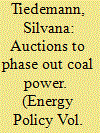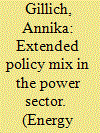|
|
|
Sort Order |
|
|
|
Items / Page
|
|
|
|
|
|
|
| Srl | Item |
| 1 |
ID:
191224


|
|
|
|
|
| Summary/Abstract |
This study assesses the extent to which auctions for compensation payments are a suitable policy instrument for ending coal-fired power generation at minimum cost and thus achieving national climate targets. Germany is the first country to apply such a market-based mechanism. Evaluating the effectiveness and efficiency of the auction, we find that the first five of seven auction rounds will retire 10 GW of coal-fired capacity at a cost of 68 ± 5 EUR/kW, corresponding to an additional carbon price of 2.4 ± 0.2 EUR/tCO2. The possibility of administratively shutting down power plants from 2024 and a decreasing ceiling price have ensured that average compensation payments are well below the ceiling price, and low compared to other policies, even though there was no competition in two of five auction rounds. As the government cancels the freed emission allowances, the policy will result in lower emissions, even though the carbon intensity of the German coal power fleet increased slightly by 2%. Thus, the German auctions can serve as a model for national phase-out strategies in countries with similar institutional frameworks and provide a reference case for integrating conflicting policy objectives into auctions.
|
|
|
|
|
|
|
|
|
|
|
|
|
|
|
|
| 2 |
ID:
175036


|
|
|
|
|
| Summary/Abstract |
Coal power accounts for a major share within electricity production and significantly contributes to the overall greenhouse gas emissions in many European countries. According to official reports, Germany will not achieve its emission reduction targets in 2020. Therefore, a shut-down of coal capacities is currently being discussed and a plan is developed by the so-called Coal Commission.
In this study, we analyse the effects of a national coal phase-out policy on carbon emissions and prices, and compare these to the effects of EU-wide coal phase-out policies. Considering high CO certificate prices and ambitious renewable energy targets, a coal phase-out in Germany would have a minor additional impact on overall European emissions. An EU-wide coal phase-out however, would significantly reduce the emissions, by around 19%. Alternatively, a very high CO certificate price policy provides an even greater reduction in CO emissions.
|
|
|
|
|
|
|
|
|
|
|
|
|
|
|
|
| 3 |
ID:
177107


|
|
|
|
|
| Summary/Abstract |
With the phase-out of coal power plants, the existing mix of instruments aimed at decarbonising electricity sectors is getting more complex. This paper contributes to its understanding by highlighting the impact of coal phase-out, CO2-price and increasing capacity of variable renewable energies on contribution margins of power plants. By visualizing these three instruments in a brownfield screening curves model (SCM), their fundamental effects on plant operation, electricity price and margins become apparent at a glance. Moreover, the SCM allows to derive generic statements about winners and losers on the supply side. Results are then quantified within a case study for Germany using the power sector model E2M2. The high resolution regarding time and generation system permits a realistic simulation of electricity prices and thus of margins at plant level.
|
|
|
|
|
|
|
|
|
|
|
|
|
|
|
|
| 4 |
ID:
177163


|
|
|
|
|
| Summary/Abstract |
The decarbonisation of energy in a coal-producing country involves phasing out the coal sector and reducing employment in coal mining. Our case study of Poland reveals that in the past, half of the workers that left the mining sector failed to move to other sectors and left the labour market. This could be explained by the lower education levels of miners and lower wages in other sectors relative to mining. We use a mathematical model to demonstrate that if ex-miners fail to move to green or neutral sectors, decarbonisation involves a net loss of the labour force, regardless of the number of jobs created in the green sector. The loss of labour constitutes a macroeconomic cost that must be added to changes in energy system costs. The size of the cost does not depend on whether reduction of emissions is achieved by the substitution of coal with renewable energy sources or by an increase in energy efficiency. The size of the cost is largest when the reduction of emissions is achieved by replacing coal with imported gas. Finally, we demonstrate how costs related to the imperfect transition of labour could be taken into account in numerical general equilibrium models.
|
|
|
|
|
|
|
|
|
|
|
|
|
|
|
|
| 5 |
ID:
176886


|
|
|
|
|
| Summary/Abstract |
Poland is the largest hard coal and second largest lignite producer in the EU, generating around 80 percent of its electricity from coal. Resistance to a reduction in coal production and consumption comes from various actors, namely, coal corporations, unions, parts of civil society and the government – as well as their coalitions. Their opposition centres around the prospect of losing their business, past negative experiences with structural change, fears of rising energy prices and energy security concerns, as well as potential unemployment in regions almost entirely dependent on coal.
|
|
|
|
|
|
|
|
|
|
|
|
|
|
|
|
|
|
|
|
|